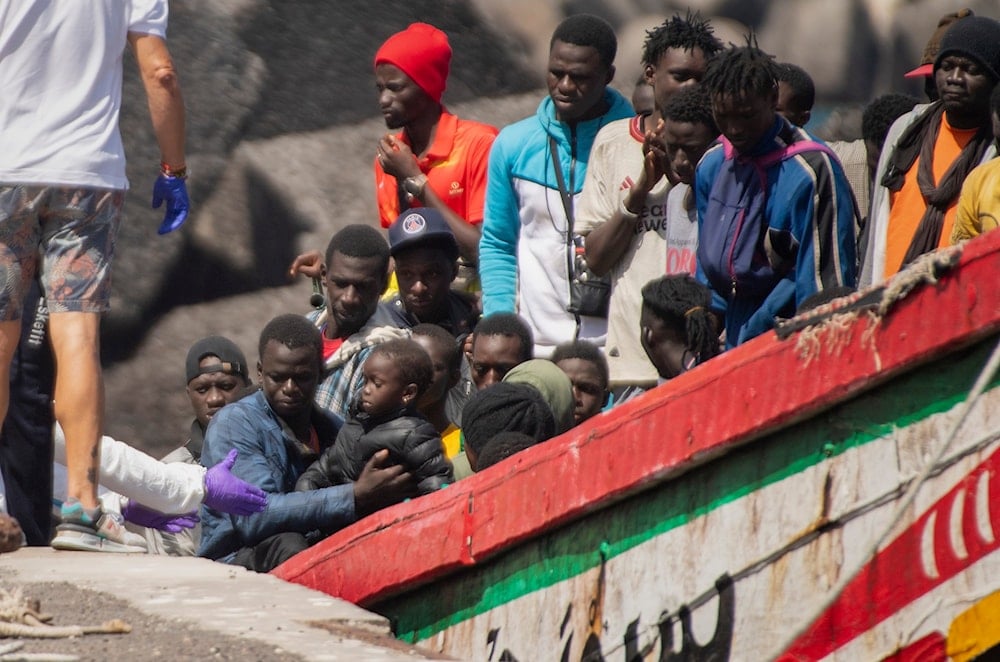Record number of migrants lost at sea bound for Spain in 2024: NGO
Migrant rights group Caminando Fronteras says at least 10,457 migrants died or disappeared while trying to reach Spain by sea in 2024.
-

A child is carried ashore from a crowded wooden boat as they arrive at the port in La Restinga on the Canary island of El Hierro, Spain, on August 18, 2024 (AP)
At least 10,457 migrants lost their lives or went missing while attempting to reach Spain by sea in 2024, an NGO reported on Thursday
This marks a 58% increase from the previous year and the highest toll since the organization began tracking the figures in 2007.
The report, covering the period from January 1 to December 5, 2024, issued by migrant rights group Caminando Fronteras (Walking Borders), revealed that among the victims were 1,538 children and 421 women. This results in an average of 30 deaths per day, compared to approximately 18 per day in 2023.
The group gathers its data from hotlines set up for migrants in distress at sea, reports from families of missing migrants, and official rescue statistics. It attributed the rise in deaths to the use of fragile boats, the adoption of more perilous routes, and a lack of resources for rescue operations.
In a statement, the group's founder Helena Maleno pointed out that "these figures are evidence of a profound failure of rescue and protection systems. More than 10,400 people dead or missing in a single year is an unacceptable tragedy."
The victims were from 28 nations, mostly in Africa, but also from Iraq and Pakistan.
Deadly route from Africa to Canary Islands
The majority of the fatalities—9,757—occurred along the Atlantic migration route from Africa to Spain's Canary Islands, which has seen a record number of migrants for the second consecutive year.
On Christmas Day, Spain's maritime rescue service reported on social media platform X that seven migrant boats had arrived in the archipelago.
The Canary Islands are located just 100 kilometers (62 miles) from the coast of North Africa at their closest point. The shortest route stretches between the coastal town of Tarfaya in southern Morocco and the island of Fuerteventura in the Canaries.
Read next: Spain's parliament to draft bill to legalize undocumented migrants
The Atlantic route is especially dangerous, with many overcrowded and poorly equipped boats unable to withstand the strong ocean currents. Some boats set off from African shores as far as 1,000 kilometers (620 miles) away from the Canaries.
To evade controls, smugglers often take longer, more perilous routes, steering west into the open Atlantic before turning north towards the Canaries. This detour has led many migrants to the small, westernmost island of El Hierro, which has seen an unprecedented surge in arrivals since last year.
The regional government of the Canaries has stated that it is overwhelmed by the situation.
'Lead to tensions'
In his Christmas Eve broadcast, Spain's King VI warned that "without proper management" of migration, "it can lead to tensions that erode social cohesion."
"How we are able to deal with immigration --which also requires good coordination with our European partners, as well as with the countries of origin and transit --will say a lot in the future about our principles and the quality of our democracy," he added.
In August, Spanish Prime Minister Pedro Sanchez toured West African countries to strengthen local efforts to combat illegal migration from Mauritania, Senegal, and The Gambia—the primary departure points for migrant boats heading to the Canary Islands.
Along with Italy and Greece, Spain is one of the three major European gateways for migrant arrivals.
According to the interior ministry, 60,216 migrants entered Spain irregularly between January 1 and December 15, marking a 14.5 percent increase compared to the same period last year.
The majority, over 70%, landed in the Canaries

 4 Min Read
4 Min Read








